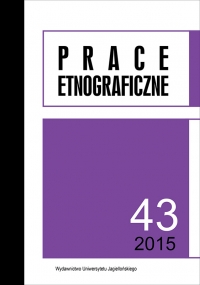Między kosmopolityzmem a lokalnością, czyli wybrane zagadnienia z kultury ubioru Starego Sącza i okolic w latach 1860 – 1918. Ćwiczenia z rekonstrukcji
Between Cosmopolitism and Localness: Selected Issues Concerning Dress Culture of Stary Sącz and Surrounding in 1860–1918. Some Exercises of Reconstruction
Author(s): Monika Golonka-CzajkowskaSubject(s): History, Cultural history, Ethnohistory, Local History / Microhistory, Modern Age, Recent History (1900 till today)
Published by: Wydawnictwo Uniwersytetu Jagiellońskiego
Keywords: cultural heritage; regionalism; folk dress; ethnography; Stary Sącz; Lachy Sądeckie
Summary/Abstract: Reconstruction practices are one of the most popular legitimacy strategies, used in process of making cultural heritage. Customers treat them with a great esteem, and they are expected to bring to reconstructed elements desired importance of authenticity. A contemporary ethnographer/anthropologist is usually diffident when facing such practices, and he focuses on critical description and deconstruction of the practices. But what can he do when local activists ask him to actively participate in the experiment as a so-called expert, whose task is e.g. to reconstruct local folk dress? Of course, his or her decision will depend primarily on research interests and chosen specialization, but the most important issue will be his or her understanding of the ethnographer/anthropologist profession. Thus, some researchers would be sceptic and refuse any assistance, and thereby avoid criticism of their own professional environment, accusing them of mythologization, reification, being peasantry-lover etc. Others will take on the role of full-time experts, who would join different types of bodies and committees, and decide what is and what is not proper in the spectacle they would observe, thus becoming the guardians of the regime of truth folklore. The third strategy, which in my opinion can help to break the deadlock described above, is the participation in the project considered as an open dialogue. Thereby we can try to avoid being an authoritarian arbiter and we can become a real consultant, a person who – according to the Latin root consultare – discusses with partners (creators of a project) the results of the reconstruction as deeply as possible. When working on the reconstruction of dresses, ethnographer/anthropologist can show their complexity, place them in a local context as well as in wider social, cultural and historical context, and avoid narrow and problematic definitions of folk costume. The decision concerning the final form of representation – an album, a staging or a dance etc. – however, should be made by our partners, equipped with not only a solid dose of knowledge, but also with important sensitivity to various epistemological issues behind the process of reconstruction.
Journal: Prace Etnograficzne
- Issue Year: 43/2015
- Issue No: 4
- Page Range: 347-367
- Page Count: 21
- Language: Polish

